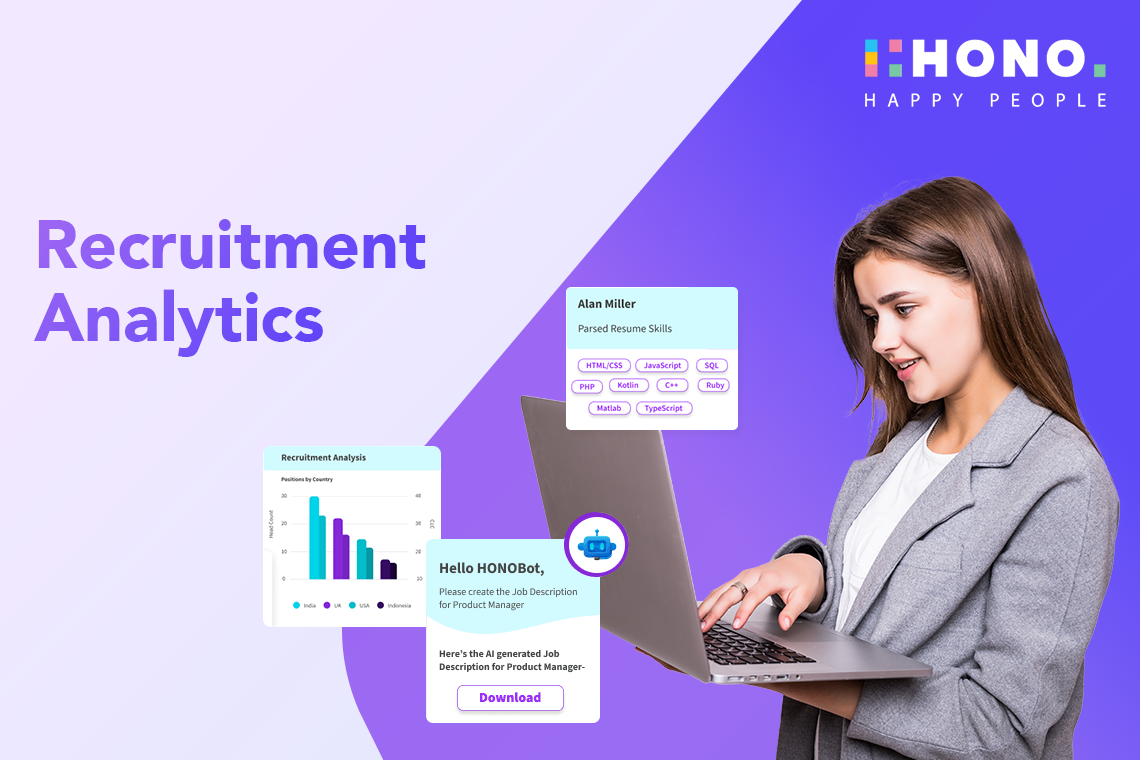- Recruitment
AI-Powered Recruitment: How to Find the Best Candidates Faster and Smarter
05 Oct, 2022 |

The Future of Recruitment: How AI is Revolutionizing the Hiring Process
224 managers at big organizations, most of whom work in human resources, were surveyed. 82% HR managers believe that HR teams will use more AI tools in their talent management processes in the next five years.
Successful businesses are adopting AI in the recruitment process to keep up with the battle for top employees. These HR departments use AI-enhanced technology stacks to improve the applicant experience, speed the hiring process, and keep track of employees.
How is AI making this possible?
To better communicate with applicants and answer their queries, these businesses may now leverage AI to develop chatbots.
AI in recruiting also helps to:
- Reduce the time HR staff spends on administrative duties by automating them.
- Improve the applicant screening process and placement.
- Elevate inclusiveness and diversity initiatives.
- Upskill and reskill the present workforce so that they are ready for the jobs of the future.
Also Read: 8 Powerful Ways Conversational AI Automates Your HR Activities
Benefits of AI in recruitment
Let’s understand each aspect of recruitment facilitated by AI one by one.
-
AI for Candidate Sourcing
Glassdoor reports that 76 percent of HR professionals say finding a suitable applicant is one of their biggest challenges.
Artificial intelligence or AI and ML in recruitment can help with this by automatically scouring numerous databases and platforms for people who meet the requisite qualifications for the position.
The recruiting process, the amount of human bias, and the quality of hiring may all be enhanced with the use of Artificial Intelligence and its solutions.
HR teams can use AI to examine job postings and applications, find the best applicants with machine learning algorithms, and anticipate how they will perform with the use of predictive analytics.
AI for enhanced hiring by reducing human biases
By analyzing language patterns and emphasizing phrases emerging around gender, ethnicity, or age, AI assists recruiters in writing more inclusive job descriptions.
The idea behind reducing AI bias in recruitment is to educate the algorithm to ignore extra identifying information that can lead to prejudiced results and to train it to focus on data that looks to be gender-neutral.
Incorporating AI into your recruiting process may make it much simpler to achieve the diversity, equity, and inclusion (DE&I) goals that most corporate organizations have established. -
AI in recruitment and selection
AI can analyze resumes and job applications to discover and select the most suitable people based on skills, experience, and qualifications.
Let’s see how a resume parsing is done by AI
All resumes for a certain post are first uploaded into the parsing programme, either automatically or manually.
After applicants have submitted their resumes, resume parsing software goes through each one to pull out the information the recruiter is looking for. Specific job abilities, work experience, contact information, school information, professional certifications, and so on are all examples of information that may be considered relevant.
Parsing software eliminates the need for recruiters to spend many hours manually sorting through applications in search of relevant information or rejecting those that are completely devoid of it.
Circling back to the screening process, candidates participate in a job simulation in which they are given the opportunity to try out some of the tasks they could be asked to perform if hired. They may be invited to the next round of the recruiting process based on how well they perform and what they've accomplished so far. -
AI for Interviewing process
Chatbots can help you schedule interviews.
You can even conduct a middle-stage automated interview before inviting a candidate to visit in person if you like. Generative ai in Recruitment can help you with many aspects.
Applicants can answer a series of pre-programmed questions, and AI technologies can evaluate their facial expressions, tone of voice, and overall emotional intelligence.
This might assist you in selecting applicants who best match the culture of your company. -
AI for Onboarding
AI can help you with the generative ai in onboarding process by streamlining paperwork, scheduling training sessions, and presenting new workers with pertinent information about their job and the firm.
AI-powered solutions will ensure that all new recruits receive copies of documentation describing business policies and login information.
They may schedule meetings to go over the information in further depth as required, request an electronic signature, and track when papers have been reviewed and signed.
This frees up HR departments to focus on other duties that require a human touch and cannot be completed outside of business hours. -
Role of AI in recruitment
Generative ai in Recruitment helps process in a variety of ways. Recruiters, for example, may swiftly and easily match high-quality prospects with vacant opportunities if you have a powerful AI-driven platform.
This speeds up the hiring process by saving recruiters the time it would have required to manually match those individuals and their talents to vacant positions.
An AI-powered method enables better collaboration: hiring managers may collaborate with recruiters to fine-tune what is truly required (in terms of capabilities), and results can be obtained rapidly. As a consequence, the job requirements may be fine-tuned.
When your recruiters are more efficient and can uncover the right prospects faster, the organization's overall time-to-hire decreases (a critical statistic for all Talent Acquisition teams).
By simplifying the process with the use of AI in recruitment, you can move applicants more effectively from the awareness stage to the application stage, through the interview stage, and all the way to offer acceptance than if your recruiters did not have the assistance of AI. And you may be certain that your recruiting decisions are based on the abilities required for the position.
Also Read: The Impact of AI on Talent Management: Streamlining Recruitment Processes -
AI in candidate experience personalization
AI helps recruiters and TA teams to personalize the applicant experience based on the prospect's specific abilities and interests.
When recruiters are aware of a prospect's preferences, they may more readily deliver customized communications with tailored content and fresh employment possibilities that the candidate is interested in.
The major role of AI in recruitment is to enable recruiters to develop and foster connections with applicants, distinguishing your organization from other companies they may be considering.
You can ensure that you can continue relevant and personalized contacts with applicants at all phases of the recruiting process by using AI-powered Applicant Portals.
To solve your problem and challenges in recruitment, we bring you the HONO foundation toolkit. The HONO Hire to Retain Solution starts before you even hire someone and continues well after they leave your company.
The solutions are made for your HR team to help employees balance their work and personal lives, team managers improve business results, HR makes the whole Workforce Lifecycle easier, and organizations render positive improvements.
.png?width=50&height=50&name=Team%20HONO%20logo-01%20(1).png)



